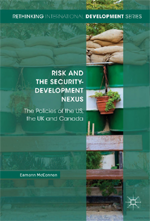 IICRR Research Fellow Dr Eamonn McConnon has published a book on how security and development policies interact with each other. Entitled Risk and the Security-Development Nexus: The Policies of the US, the UK and Canada, it is published by Palgrave Macmillan in its Rethinking International Development series.
IICRR Research Fellow Dr Eamonn McConnon has published a book on how security and development policies interact with each other. Entitled Risk and the Security-Development Nexus: The Policies of the US, the UK and Canada, it is published by Palgrave Macmillan in its Rethinking International Development series.
This book explores the merging of security and development in the policies of the US, the UK and Canada. It argues that instead of framing this relationship as a ‘securitisation’ of development, it is best understood as a form of security risk management, where development aid is expected to address possible security risks before they emerge.
It was launched on 21st February in the Hodges Figgis bookshop in Dublin by former Tánaiste and foreign minister, Eamon Gilmore.
Reviews
‘In this comprehensive and wide-ranging analysis, McConnon demonstrates the extent to which security concerns have come to pervade the development policies of the three major donor countries.’
—Rita Abrahamsen, University of Ottawa, Canada
‘An original and compelling analysis of the security-development nexus of three donor countries here combined with a closer look at how their policies play out in two recipient countries, Kenya and Ethiopia, which are actually more representative than the usual high-profile cases of Afghanistan and Iraq. McConnon’s application of the risk-management lens is theoretically innovative and insightful. A most welcome contribution to the growing literature in this area.’
—Stephen Brown, University of Ottawa, Canada
‘The argument that security has been brought in to mainstream development policy partly, but not solely, because of the War on Terror is here meticulously detailed. The implication of this is that the security-development nexus is not an abstract idea, but a risk management strategy by the West. Using extensive documentary evidence McConnon provides a very clear discussion of policy that has big implications for theoretical approaches to development and security.’
—Paul Jackson, University of Birmingham, UK
This book explores the merging of security and development in the policies of the US, the UK and Canada. It argues that instead of framing this relationship as a ‘securitisation’ of development, it is best understood as a form of security risk management, where development aid is expected to address possible security risks before they emerge.


